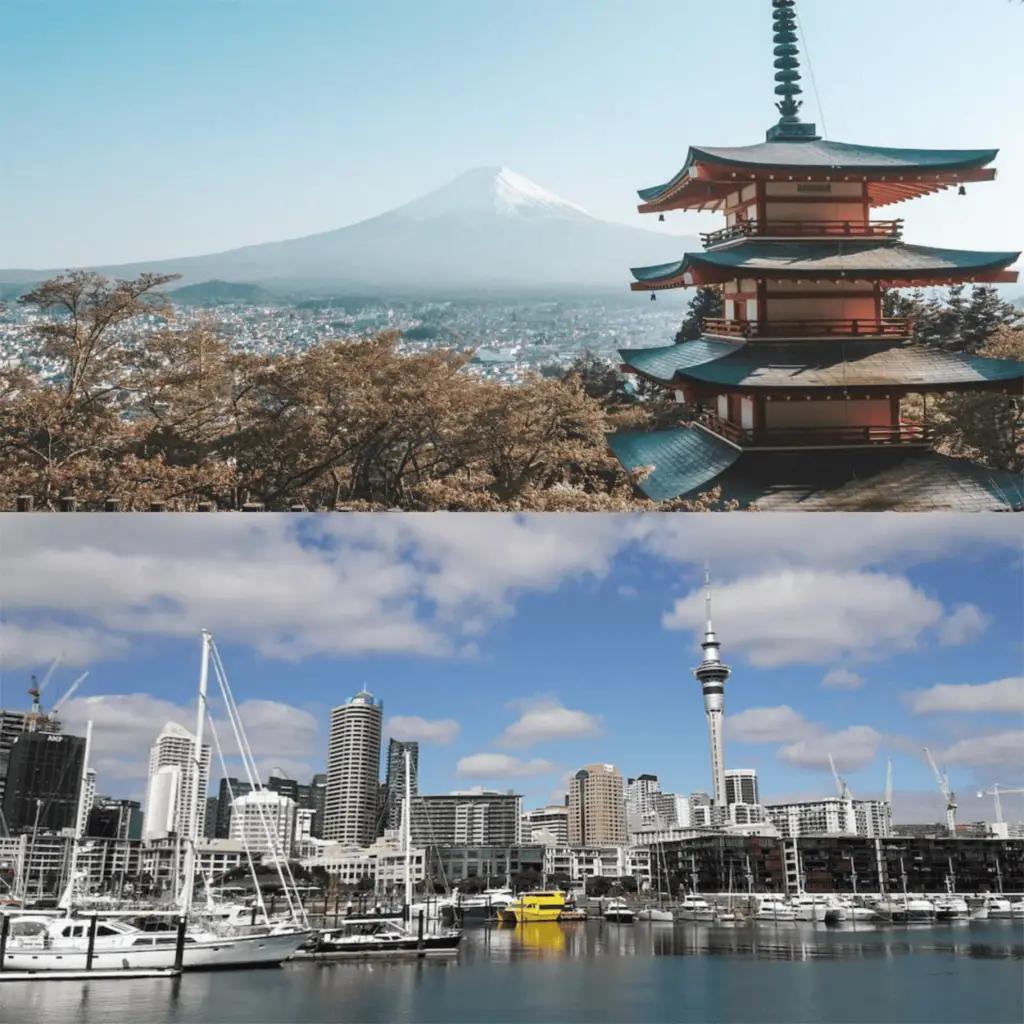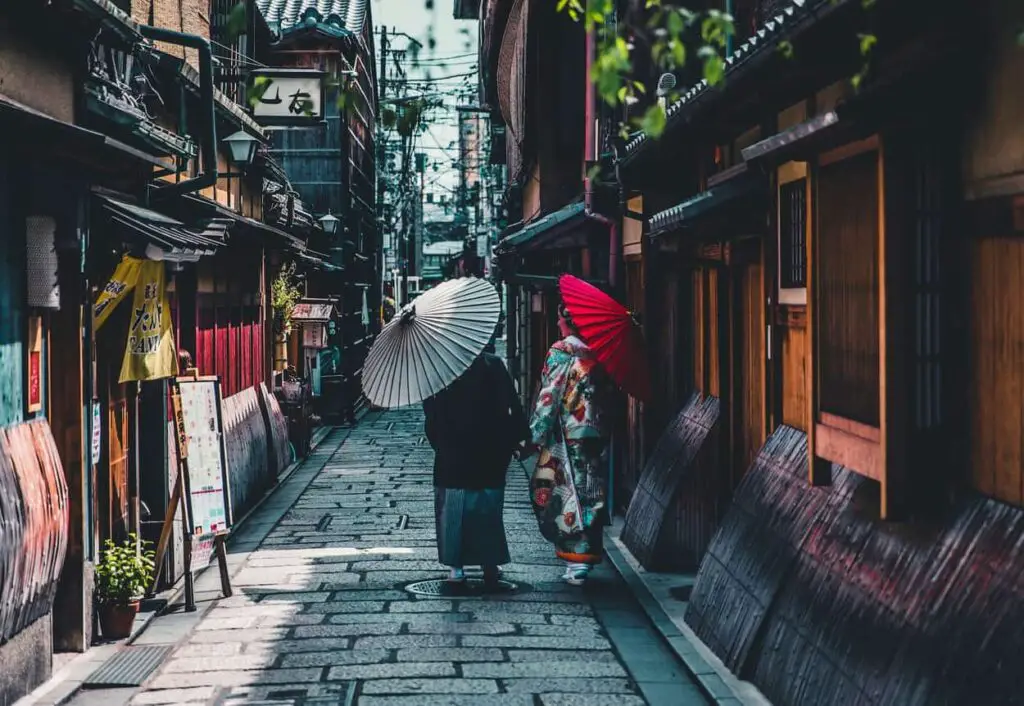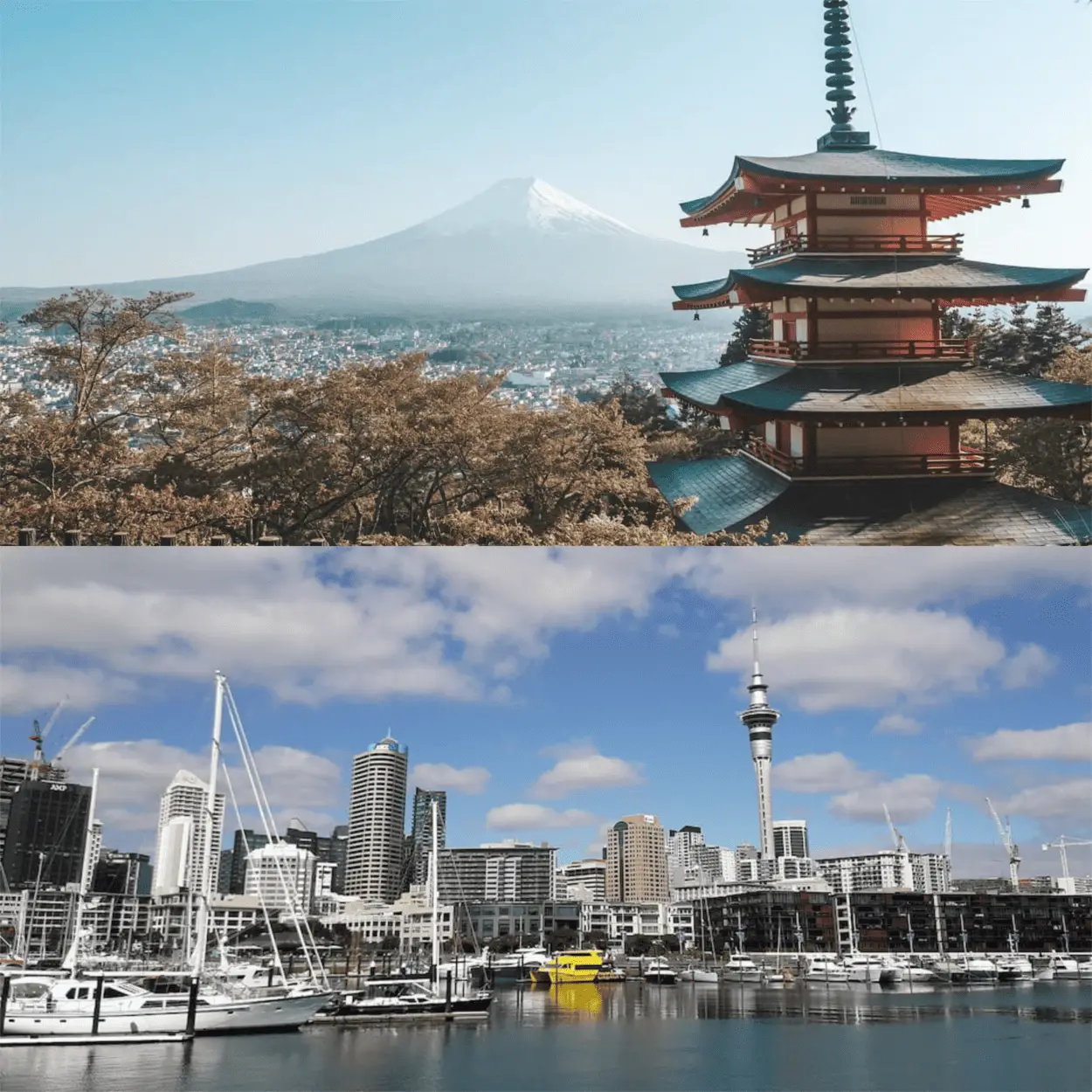Living in New Zealand vs Japan: Which Country Is Better?

What does New Zealand have in common with Japan? They’re both island nations in the Pacific Ocean, and…well, that’s about it. Of course, they’re both appealing destinations to visit and even to move to, but which country is going to offer the best change of scenery for you and your family?
There are considerable differences between living in New Zealand and Japan, many of which relate to the cultures and traditions of each country, as well as the fundamentals of daily life. Besides, wages and cost of living are higher in Japan vs NZ.
So, is it to be the land of the long white cloud or the land of the rising sun? Whether you are moving to New Zealand or Japan, it’s important not to romanticise either place and make an informed decision about your new home.
NZ and Japan have many differences for new residents, and while we should celebrate those differences, it’s important to really think about what makes the most difference to your life. Let’s break it down and see who wins when it comes to NZ vs. Japan.
Which country is better for living in New Zealand or Japan?
It’s an exaggeration to say that Japan is a closed society, but until recently, it was almost as though the country was actively discouraging foreigners who wanted to move there. You might have difficulty overcoming the biggest hurdle, which is the language barrier.
It’s estimated that up to 30% of the Japanese population has some English language abilities, although only 2% of the population can claim to be fluent in English. This is something to be aware of, if you don’t speak Japanese and are planning a move, you better start now. Without learning Japanese, adapting to the local way of life will be impossible. The Berlitz language school regularly lists Japanese as one of the hardest languages for an English speaker to learn.
A relocation to Japan will be challenging, and even though this website is all about moving to New Zealand, is it really that simple to choose one over the other? Each nation has its own amazing benefits — as well as a few drawbacks.
Pros of living in New Zealand
Firstly, New Zealand is an English-speaking country, which can make settling in much easier. As mentioned, English isn’t so widely spoken in Japan. You’ll need to learn the language.
New Zealand has natural beauty and an unspoiled landscape. This isn’t to suggest Japan isn’t a beautiful place (often stunningly so), but it’s more developed than NZ, making it hard to feel like you can get away from it all.
And yes, you really can get away from it all in New Zealand. NZ features a low population density of approximately 20 people per square km (or 214th in a list of 252 surveyed countries).
You’re always close enough to the beach since nowhere in NZ is more than 128 km from the sea.
- NZ offers a relaxed pace of life, leading to an excellent work/life balance.
- Apart from extreme weather events, NZ’s weather tends to be moderate and pleasant.
- It’s the 4th safest country on the planet, according to the 2023 Global Peace Index.
It’s a progressive country in many ways. Jacinda Arden was the country’s third female prime minister. How many women have led Japan? That would be none…yet.
NZ is a nuclear-free country and has been since 1987 (although nuclear-powered vessels have been banned from NZ’s territorial waters since 1984).
Cons of living in New Zealand
It’s pretty quiet. NZ’s largest city (Auckland) has a metropolitan population of just over 1.7 million people, compared to Tokyo’s 40.8 million residents. NZ will never be as lively as other countries, which might be a pro!
It’s isolated. Flying to your home country will involve a lot of time on a plane, will probably involve multiple transfers, and can be expensive.
There’s a lack of travel infrastructure. For example, Japan is linked by an extensive rail network, but New Zealand has just a handful of passenger rail services.
New Zealand’s cost of living is quite high on a global scale – more so than Japan (with most things).
The country’s geography leads to specific natural disasters, and an earthquake or volcanic eruption isn’t out of the question. But, of course, the same can be said for Japan.
Housing prices can be unpredictable, and much of the country’s housing stock needs upgrades. It’s hard to find a bargain when the house needs significant work after you buy it.
Pros of living in Japan
Japan’s population is highly urbanised, with an estimated 92% of the population living in urban zones. If you want fast-paced city life, you won’t need to look hard.
The country’s economy remains powerful, and Japan’s gross domestic product (GDP) ranking is 4th in the world (with NZ coming in much further down the list in 53rd place).
Is it so complicated for a country to have public transport that spans the entire nation, is punctual, clean, and safe? Apparently, it’s too complicated for New Zealand, whose public transport network and intercity travel options leave a lot to be desired. Japan, on the other hand, enjoys some of the best public transport in the world.
New Zealand cuisine hasn’t taken the world by storm. Can you name a single New Zealand food? No, kiwifruit doesn’t count (they’re originally from China and were rebranded as kiwifruit for marketing purposes in the 1960s). Sushi, on the other hand, has spread across the world. You can eat it to your heart’s content in Japan without stretching your finances too much.
What’s New Zealand’s best-known contribution to global culture? It’s probably The Lord of the Rings film franchise. What about Japan? Take your pick. Manga can trace its origins back to the 12th century, and anime is nothing short of a cultural powerhouse.
Respectfulness and politeness are a way of life in Japan. It can be a formal society, especially for those finding their way in a new country, but you will consistently be treated with respect.
Japan has an exceptionally strong economy with a low unemployment rate (which is around 2.6%). New Zealand’s is 3.9%, and the significantly smaller population means there are fewer job opportunities than in Japan.
Cons of living in Japan
Those Japanese job opportunities will not be in your future unless you speak Japanese. You could argue that it’s silly to move to a country without making an effort to learn the local language, but without a reasonable level of fluency in Japanese, you will find yourself to be excluded from many parts of life.
We think fast-paced city life is a potential pro of living in Japan, but it comes with a disclaimer. Aside from small towns and villages, be prepared for crowds everywhere, and you’ll have to queue for everything. It’s lucky that people are generally so polite and respectful!
In addition to queuing for everything, get ready to have to fill in paperwork for everything. Japanese society is extremely bureaucratic, and it seems like you have to fill out a bunch of forms for even minor bureaucratic matters.
Japan’s overpowering work pressures on employees, combined with an emphasis on social cohesion instead of individual identity, has led to a culture of alienation. Japan has a massive subculture of hikikomori (shut-ins). A variety of social pressures have led an estimated 1.5 million, mostly young people, to basically withdraw from the world, never leaving their homes.
Cost of living in New Zealand vs Japan

There are some major differences in the cost of living when you compare New Zealand to Japan. Japan comes out on top with most comparisons. Consumer prices in Japan (including the cost of your rent) are 38.1% lower than in New Zealand.
Your rent (or mortgage) may be lower in Japan, but this doesn’t tell the whole story. An average new house in New Zealand has an average floor space of 176 square metres. In Japan, it’s 132 square metres. You may be paying less due to the smaller size of the dwelling.
Neither country will be kind to your bank account since both New Zealand and Japan are expensive countries in international rankings. Japan is a larger market, which leads to more competition, which leads to lower prices. New Zealand can’t quite compete.
Quality of life
The Organisation for Economic Co-operation and Development (OECD) is mainly concerned with, well, economic development. However, they believe that the quality of life in any given country is a factor that drives economic growth. This is why they conduct an annual, all-inclusive survey to measure the quality of life in a country (ranked out of 10).
The OECD global average is 6.7, so New Zealand’s 7.3 is a strong sign that Kiwis are (mostly) happy with their quality of life. Japan ranked lower than average, with 6.1 out of 10.
Japanese responses to the survey questions highlighted problems with income (excessive working hours without fair compensation), as well as a lack of social engagement, leading to widespread loneliness—such as the growing trend of young people withdrawing from society as they become hikikomori.
Visa and PR
It’s only in recent years that Japan has opened itself up to migrants. There have always been small migrant communities, but certain work visas issued by the Japanese government were only valid for 5 years. A few exceptions were made for in-demand jobs, like education, medicine, and engineering.
This special skill visa didn’t necessarily require a qualification (like a university degree) but demonstrated experience and some knowledge of Japanese. After 5 years, it was expected that the holder would return to their home country—and this used to be unavoidable. Nowadays, after 5 years, this visa can be converted into a permanent residence permit, although this isn’t guaranteed.
Some professions are automatically granted longer visas (without the need to convert them at a later stage). And then there are a number of white-collar professions where a visa can be granted for the exclusive purpose of working in that profession. These may be for a few months or a few years and can generally be extended.
New Zealand’s immigration policy isn’t too different. The country operates a point-based system where you’re awarded various points for your qualifications, potential income, and previous experience in your role. You must also have a job offer from a New Zealand employer. After you’ve been (legally) in New Zealand for 24 months, you can apply to convert your existing visa to permanent residence.
Job opportunities
We’ve already mentioned it, but it’s worth mentioning again: your opportunities in Japan will be limited without fluency in the language. There are also some opportunities that are limited by law.
Even if they speak perfect Japanese, foreigners are barred from positions that may involve government policy or the exercise of power (law enforcement, tax collection, most government roles). You could be a low-level civil servant without the potential for advancement.
However, English teachers are in huge demand in Japan — as are most educators. Japanese data sciences and software engineering are also in need of new talent. A small percentage (3.17%) of the Japanese economy is based upon agriculture, with manufacturing (a declining industry) accounting for a further 23.71%. The remaining 73.12% is made up of services, which is every other possible industry.
In New Zealand, in-demand jobs are medicine (doctors and nurses), civil engineering, and construction. Remember that New Zealand is a fairly rural society, with limited employment opportunities outside of major centres.
Work culture
Employment contracts in Japan are pretty clear about what’s expected from an employee with things like working conditions, including working hours and overtime. What’s written in a contract may not bear much resemblance to reality.
Karoshi is a word you won’t want to hear when working in Japan. It means death by overwork and is the phenomena of work pressures dominating and ultimately destroying a person’s life. Things are changing…slowly.
Overtime is expected, and declining a request to work overtime without good reason will almost certainly be frowned upon. It’s estimated that an average Japanese person will work for 1,633.2 hours per year. In New Zealand, it’s 1,369 hours per year. The work/life balance in New Zealand is far kinder to employees—who get 264 more hours of free time (about 11 days) than their Japanese friends.
Salaries
The median salary of a New Zealand worker is NZ$848 per week (or NZ$44,096 per year). Knowing the median salary for a specific occupation is more helpful since you can link it to your profession (or intended profession). Someone working in healthcare, pharmaceuticals, or social services can expect a median income of NZ$94,237 per year—more than double the national median.
A typical Japanese worker can expect to take home approximately JP¥471,000 (NZ$5,302) per month or NZ$63,624 per year. That median is obviously higher than New Zealand’s, but remember that, on average, someone in Japan works 264 more hours each year than a New Zealander.
Taxes
Unlike many countries, New Zealand does not have a tax-free threshold. Income up to NZ$14,000 is taxed at a rate of 10.5%. For income between NZ$14,000 and NZ$48,000, a tax rate of 17.5% is applied. Income between NZ$48,000 and NZ$70,000 is subject to a 30% tax rate.
Individuals earning between NZ$70,000 and NZ$180,000 will pay a 33% tax rate. The highest tax bracket, with a rate of 39%, is applied to income over NZ$180,000.
Similarly, Japan doesn’t have a tax-free threshold and uses a progressive system. The lowest tax band is for those earning up to JP¥1,950,000 (NZ$21,955) who pay a tax rate of 5%. JP¥1,950,000 to JP¥3,300,000 (NZ$37,150) pay a 10% rate. From JP¥3,300,000 to JP¥6,950,000 (NZ$78,228) are subject to a 20% rate.
The next income band is JP¥6,950,000 to JP¥9,000,000 (NZ$101,258), with a rate of 23%, followed by JP¥9,000,000 to JP¥18,000,000 (NZ$202,483) with a rate of 33%.
This brings us to income from JP¥18,000,000 to JP¥40,000,000 (NZ$449,914) and its 40% tax rate.
Anyone who earns more than JP¥40,000,000 pays the maximum tax rate, which is 45%.
Weather and climate
Japan tends to be colder than New Zealand, and anyone wanting moderate climates should live on the Ryukyu and Nanpō Islands or anywhere on Japan’s Pacific coast. These regions have more temperate weather, with minimal snowfall and long, hot summers. Head to Hokkaido (in the north) if you’re more of a winter person.
New Zealand’s climate is similarly varied, but is less extreme than Japan, with shorter winters. Snowfall in New Zealand is mostly limited to mountain ranges and areas of higher elevation. It can snow elsewhere, but this doesn’t linger—unlike in Japan.
Culture
Japanese culture has made its way across the world. We’ve already talked about manga and anime, and you can’t overlook Godzilla or Studio Ghibli. Pop culture aside, Japanese style and cuisine are extremely well-known, whereas New Zealand’s culture may be totally unfamiliar.
New Zealand’s cultural traditions have a mix of Māori and European history, with Māori traditions existing alongside practices brought over by British settlers. Food-wise, you might find yourself enjoying a traditional Māori hangi one day and a typical meat and three veg style of roast the day after.


![Can You Move To New Zealand Without a Job Offer? [2024]](https://simplenewzealand.com/wp-content/uploads/2022/12/pexels-pascal-renet-1089303-768x512.jpg)


![Ultimate Guide To Cost of Living in New Zealand vs US [2024]](https://simplenewzealand.com/wp-content/uploads/2023/05/Blank-2-Grids-Collage-min-1-768x768.jpg)

